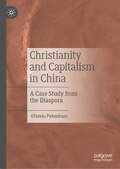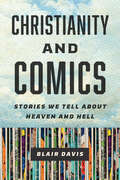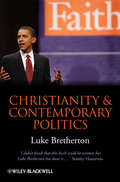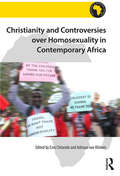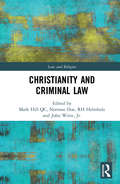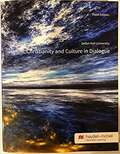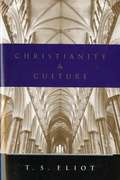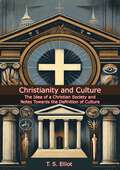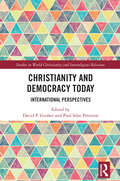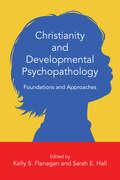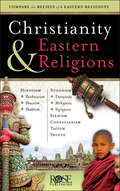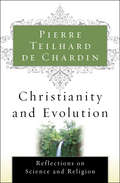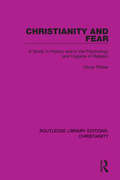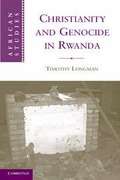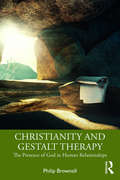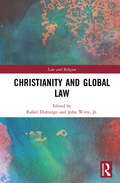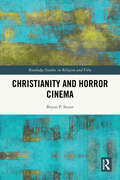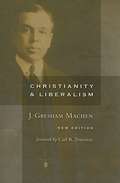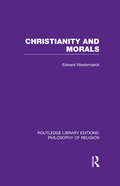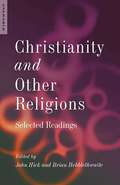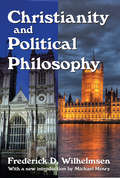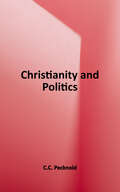- Table View
- List View
Christianity and Capitalism in China: A Case Study from the Diaspora
by Ottavio PalombaroThis book links Calvinist belief in the Perpetual Assurance of Salvation with self-efficacy for economic success. Certain values are at stake for the success of economic behavior. Since the genesis of modern capitalism, a set of beliefs proper of Calvinism (mainly Predestination but also Beruf, Inner-worldly Asceticism, role of Sects…) was said by Max Weber to cause an anxiety about salvation and generate a propensity to economic success as a sign of election. In order to observe this in action today, it is crucial to consider the evolution that the Protestant ethic went through migrating first in north America and lastly through the Protestant revival of China. Wenzhou is called ‘Jerusalem of China’ for its large Protestant community that is also strongly involved in business. Some scholar already pointed out the presence among those entrepreneurs of this Protestant ethic (Yi Xiang, Boss-Christian…). The data presented in this comparative qualitative study pertain to ethnographic observations, job-shadowing and interviews done among Chinese Christian and non-Christian entrepreneurs from Wenzhou living in Milan, Italy. The results show with some adjustments the presence of a Chinese-version of the Protestant ethic overlapping with several values proper to the Chinese context (Confucianism, lineage, social network). The extension of the study to other cases must be done with caution considering the non-causal justificatory role of the belief. Regardless: successful entrepreneurship involves specific social, cultural and even religious aspects that move beyond mere business strategies.
Christianity and Comics: Stories We Tell about Heaven and Hell
by Blair DavisThe Bible has inspired Western art and literature for centuries, so it is no surprise that Christian iconography, characters, and stories have also appeared in many comic books. Yet the sheer stylistic range of these comics is stunning. They include books from Christian publishers, as well as underground comix with religious themes and a vast array of DC, Marvel, and Dark Horse titles, from Hellboy to Preacher. Christianity and Comics presents an 80-year history of the various ways that the comics industry has drawn from biblical source material. It explores how some publishers specifically targeted Christian audiences with titles like Catholic Comics, books featuring heroic versions of Oral Roberts and Billy Graham, and special religious-themed editions of Archie. But it also considers how popular mainstream comics like Daredevil, The Sandman, Ghost Rider, and Batman are infused with Christian themes and imagery. Comics scholar Blair Davis pays special attention to how the medium’s unique use of panels, word balloons, captions, and serialized storytelling have provided vehicles for telling familiar biblical tales in new ways. Spanning the Golden Age of comics to the present day, this book charts how comics have both reflected and influenced Americans’ changing attitudes towards religion.
Christianity and Contemporary Politics
by Luke BrethertonCongratulations to Luke Bretherton on winning the 2013 Michael Ramsey Prize for Theological Writing for Christianity and Contemporary Politics!Relations between religious and political spheres continue to stir passionate debates on both sides of the Atlantic. Through a combination of theological reflection and empirical case studies, Bretherton succeeds in offering timely and invaluable insights into these crucial issues facing 21st century societies. Explores the relationship between Christianity and contemporary politics through case studies of faith-based organizations, Christian political activism and welfare provision in the West; these case studies assess initiatives including community organizing, fair trade, and the sanctuary movementOffers an insightful, informative account of how Christians can engage politically in a multi-faith, liberal democracyIntegrates debates in political theology with inter-disciplinary analysis of policy and practice regarding religious social, political and economic engagement in the USA, UK, and continental EuropeReveals how Christians can help prevent the subversion of the church - and even of politics itself - by legal, bureaucratic, and market mechanisms, rather than advocating withdrawal or assimilationEngages with the intricacies of contemporary politics whilst integrating systematic and historical theological reflection on political and economic life
Christianity and Controversies over Homosexuality in Contemporary Africa (Religion in Modern Africa)
by Ezra Chitando and Adriaan van KlinkenIssues of homosexuality are the subject of public and political controversy in many African societies today. Frequently, these controversies receive widespread attention both locally and globally, such as with the Anti-Homosexuality Bill in Uganda. In the international media, these cases tend to be presented as revealing a deeply-rooted homophobia in Africa fuelled by religious and cultural traditions. But so far little energy is expended in understanding these controversies in all their complexity and the critical role religion plays in them. Complementing the companion volume, Public Religion and the Politics of Homosexuality in Africa, this book investigates Christian politics and discourses on homosexuality in sub-Saharan Africa. The contributors present case studies from various African countries, from Nigeria to South Africa and from Cameroon to Uganda, focusing on Pentecostal, Catholic and mainline Protestant churches. They critically examine popular Christian theologies that perpetuate homophobia and discrimination, but they also discuss contestations of such discourses and emerging alternative Christian perspectives that contribute to the recognition of sexual diversity, social justice and human rights in contemporary Africa.
Christianity and Criminal Law (Law and Religion)
by John Witte Jr Norman Doe Mark Hill Qc Rh HelmholzThis collection, by leading legal scholars, judges and practitioners, together with theologians and church historians, presents historical, theological, philosophical and legal perspectives on Christianity and criminal law. Following a Preface by Lord Judge, formerly Lord Chief Justice of England and Wales, and an introductory chapter, the book is divided into four thematic sections. Part I addresses the historical contributions of Christianity to criminal law drawing on biblical sources, early church fathers and canonists, as far as the Enlightenment. Part II, titled Christianity and the principles of criminal law, compares crime and sin, examines concepts of mens rea and intention, and considers the virtue of due process within criminal justice. Part III looks at Christianity and criminal offences, considering their Christian origins and continuing relevance for several basic crimes that every legal system prohibits. Finally, in Part IV, the authors consider Christianity and the enforcement of criminal law, looking at defences, punishment and forgiveness. The book will be an invaluable resource for students and academics working in the areas of Law and Religion, Legal Philosophy and Theology.
Christianity and Culture in Dialogue
by Seton Hall UniversityChristianity and Culture in Dialogue (Third Edition)
Christianity and Culture: The Idea of a Christian Society and Notes Towards the Definition of Culture
by T. S. EliotTwo long essays: "The Idea of a Christian Society" on the direction of religious thought toward criticism of political and economic systems; and "Notes towards the Definition of Culture" on culture, its meaning, and the dangers threatening the legacy of the Western world.
Christianity and Culture: The Idea of a Christian Society and Notes Towards the Definition of Culture
by T. S. ElliotChristianity and Culture by T. S. Eliot is a profound and thought-provoking exploration of the relationship between religion, society, and cultural identity. This volume brings together two of Eliot’s influential essays, The Idea of a Christian Society and Notes Towards the Definition of Culture, offering readers an insightful examination of how faith shapes the moral and intellectual fabric of civilization.In The Idea of a Christian Society, Eliot argues that a society grounded in Christian principles fosters justice, community, and a shared sense of purpose. He reflects on the moral decay that can result from secularism and materialism, contending that cultural renewal requires the influence of faith in both personal and public life. For Eliot, Christianity offers not just spiritual salvation but also a framework for building a society where human flourishing is guided by moral truth and collective responsibility.In Notes Towards the Definition of Culture, Eliot delves into the meaning and purpose of culture, considering how religious belief, education, and tradition are interwoven with cultural development. He emphasizes the importance of preserving cultural heritage and reflects on the role of Christianity in maintaining social coherence. Eliot also discusses the need for intellectual humility and openness to transcendence in the face of modern challenges.Together, these essays offer a compelling vision of culture as inseparable from religious values, inviting readers to reflect on the interplay between faith, tradition, and the common good. Christianity and Culture is essential reading for those interested in philosophy, theology, or cultural studies, offering timeless insights into how Christian belief can inform both individual lives and the broader society. Eliot’s work challenges modern readers to reconsider the role of faith in shaping not only personal values but also the cultural and moral direction of society.
Christianity and Democracy Today: International Perspectives (Studies in World Christianity and Interreligious Relations)
by David P. Gushee Paul Silas PetersonThis volume explores Christianity’s relationship with democracy in a global perspective.How are the various democratic ideals being addressed by influential Christian intellectuals, theologians, ethicists, churches and church leaders around the world today? The contributors reflect on the status of the democratic idea in the churches, theological academy and public religious life in a variety of social and political contexts. They consider how the democratic idea can be cultivated in Christian communities and intellectual traditions with a view to contemporary challenges.This book will be of particular interest to scholars of religion, theology and political science.
Christianity and Developmental Psychopathology: Foundations and Approaches
by Kelly S. Flanagan Sarah E. HallChristianity and Developmental Psychopathology
Christianity and Eastern Religions
by Rose PublishingThis ebook contains a detailed comparison of Christianity with 11 Eastern Religions, including the major types of Hinduism and Buddhism. Christianity & Eastern Religions looks at the following topics:* Key Beliefs on God and the Purpose of Life/Salvation * Origins, founders and other major historical figures* Sacred Writings * Distinctive Practices and Major Celebrations * Denominations, and Number of Adherents* The focus on the Dalai Lama * Profiles of other Eastern religions, including: - Sikhism, Confucianism, Taoism, Shinto, as well as beliefs and practices such as reincarnation and karma, yoga, Eastern meditationThe Growth of Eastern Religions and What it Means to ChristiansA century ago the average person knew little to nothing about eastern religions like Buddhism or Hinduism. But as globalization has brought the East and West together, eastern religious teachings and practices are rapidly influencing more and more western culture and beliefs. For example, in 1900 an estimated 1% of North Americans believed in Hindu or Buddhist reincarnation compared with approximately 25% of the U.S. population who believe in reincarnation today. With missionary zeal, Hindu gurus and Buddhist monks - such as the Dali Lama of Tibetan Buddhism and the Maharishi Mahesh Yogi of Transcendental Meditation - have traveled to the West to spread their beliefs. Some eastern religious beliefs and practices have been popularized in western culture through meditation, feng shui, martial arts, acupuncture, and Asian medicine. But the foundational beliefs of the eastern religious worldview remain in stark contrast to the Christian worldview. Christianity & Eastern Religions helps Christians understand their own beliefs as well as those of other religions. Use this ebook to teach the Scriptural basis for why Christians --1. Believe there is a God who is personal, powerful, and has a fatherly interest in our lives2. Believe that there is only one physical life, and then the judgment3. Believe that man can never be good enough to evolve to perfection, inner peace, or pleasing God4. Believe that Christ is the only way5. Believe that Christ is the means to inner peace, blessedness, and pleasing God
Christianity and Ethnicity in Canada
by Paul Bramadat David SeljakOver the past decade, scholars and policy makers interested in Canadian multiculturalism have begun to take religion much more seriously. Moreover, Christian communities have become increasingly aware of the impact of ethnic diversity on church life. However, until very recently almost no systematic academic attention has been paid to the intersection between the ethnic and religious identities of individuals or communities. This gap in both our academic literature and our public discourse represents an obstacle to understanding and integrating the large numbers of "ethnic Christians," most of whom either join existing Canadian churches or create ethnically specific congregations.In Christianity and Ethnicity in Canada, eleven scholars explore the complex relationships between religious and ethnic identity within the nine major Christian traditions in Canada. The contributors discuss the ways in which changes in the ethnic composition of these traditions influence religious practice and identity, as well as how the nine religious traditions influence communal and individual ethnic identities. An introductory chapter by Paul Bramadat and David Seljak provides a thorough discussion of the theoretical, historical, and empirical issues involved in the study of Christianity and ethnicity in Canada. This volume complements Religion and Ethnicity in Canada in which the authors address similar issues within the six major non-Christian communities in Canada, and within Canadian health care, education, and politics.
Christianity and Evolution: Reflections on Science and Religion
by Pierre Teilhard de ChardinThe author of The Phenomenon of Man reconciles passionate faith with the rigor of scientific thinking. With his unique background as a geologist, paleontologist, and Jesuit priest, Pierre Teilhard de Chardin was a powerful exponent of the view that scientific theories could comfortably coexist with religious faith. To this day, his ideas provoke passionate debates in communities that view science and faith as necessarily separate ideologies. In this collection of nineteen essays, Teilhard seeks to illuminate a middle ground between science and religion that he felt both disciplines could accept. He explores the Fall and original sin, the possibility of life on other planets, and the role that God may have played in the process of human evolution, successfully challenging contemporary theologians to rethink their views of the universe and its creation. &“Like other great visionary poets—Blake, Hopkins, Yeats—Teilhard engages the reader both intellectually and sensually.&” —The Washington Post Book World &“An excellent blend of theological speculation with practical or ascetical application.&” —Catholic Telegraph
Christianity and Fear: A Study in History and in the Psychology and Hygiene of Religion
by Oscar PfisterOriginally published in 1948, Christianity and Fear explores the nature and history of Christian love in relation to the problem of fear. Based on methods of depth psychology and mental hygiene, the book argues for the necessity of a general concentration of the Christian religion and way of life upon the unity of love through faith and faith through love. It presents the struggle between the teaching of Christian love and the many instances of disputes on dogma that have prompted hatred and fear throughout ecclesiastical history. By using the theory of fear and compulsions, it attempts to explain the directions assumed by these aberrations in Christian history and to highlight love as the essence of the teaching of Jesus. Christianity and Fear will appeal to those with an interest in the history of Christianity, theology, and the psychology of religion.
Christianity and Freedom Volume 2. Contemporary Perspectives ( Law and Christianity)
by Allen D. Hertzke Timothy Samuel ShahVolume 2 of Christianity and Freedom illuminates how Christian minorities and transnational Christian networks contribute to the freedom and flourishing of societies across the globe, even amidst pressure and violent persecution. Featuring unprecedented field research by some of the world's most distinguished scholars, it documents the outsized role of Christians in promoting human rights and religious freedom; fighting injustice; stimulating economic equality; providing education, social services, and health care; and nurturing democratic civil society. Readers will come away surprised and sobered to learn how this very Christian link to freedom often invites persecution. What are the dimensions of persecution and how are Christians responding to that pressure? What resources - theological, social, or transnational - do they marshal in leavening their societies? What will be lost if the Christian presence is marginalized? The answers to these questions are of crucial relevance in a world awash with religious extremism and deepening instability. Gathers top scholarship on Christianity and human rights. Corrects prevailing misconceptions of the historical development of liberal freedoms. Shows how a profound theological idea propelled innovations in human history.
Christianity and Genocide in Rwanda
by Timothy LongmanAlthough Rwanda is among the most Christian countries in Africa, in the 1994 genocide, church buildings became the primary killing grounds. To explain why so many Christians participated in the violence, this book looks at the history of Christian engagement in Rwanda and then turns to a rich body of original national and local-level research to argue that Rwanda's churches have consistently allied themselves with the state and played ethnic politics. Comparing two local Presbyterian parishes in Kibuye prior to the genocide demonstrates that progressive forces were seeking to democratize the churches. Just as Hutu politicians used the genocide of Tutsi to assert political power and crush democratic reform, church leaders supported the genocide to secure their own power. The fact that Christianity inspired some Rwandans to oppose the genocide demonstrates that opposition by the churches was possible and might have hindered the violence.
Christianity and Gestalt Therapy: The Presence of God in Human Relationships
by Philip BrownellChristianity and Gestalt Therapy is a unique integration written for psychotherapists who want to better understand their Christian clients and Christian counselors who want a clinically sound approach that embraces Christian spirituality. This book explores critical concepts in phenomenology and how they relate to both gestalt therapy and Christianity. Using mixed literary forms that include poetry and story, this book provides a window into gestalt therapy for Christian counselors interested in learning how the gestalt therapeutic model can be incorporated into their beliefs and practices. It explores the tension in psychology and psychotherapy between a rigid naturalism and an enchanted take on life. A rich mix of theory, philosophy, theology, and practice, Christianity and Gestalt Therapy is an important resource for therapists working with Christian patients.
Christianity and Global Law (Law and Religion)
by John Witte Jr. Rafael DomingoThis book explores both historical and contemporary Christian sources and dimensions of global law and includes critical perspectives from various religious and philosophical traditions. Two dozen leading scholars discuss the constituent principles of this new global legal order historically, comparatively, and currently. The first part uses a historical-biographical approach to study a few of the major Christian architects of global law and transnational legal theory, from St. Paul to Jacques Maritain. The second part distills the deep Christian sources and dimensions of the main principles of global law, historically and today, separating out the distinct Catholic, Protestant, and Orthodox Christian contributions as appropriate. Finally, the authors address a number of pressing global issues and challenges, where a Christian-informed legal perspective can and should have deep purchase and influence. The work makes no claim that Christianity is the only historical shaper of global law, nor that it should monopolize the theory and practice of global law today. But the book does insist that Christianity, as one of the world’s great religions, has deep norms and practices, ideas and institutions, prophets and procedures that can be of benefit as the world struggles to find global legal resources to confront humanity’s greatest challenges. The volume will be an essential resource for academics and researchers working in the areas of law and religion, transnational law, legal philosophy, and legal history.
Christianity and Horror Cinema (Routledge Studies in Religion and Film)
by Bryan P. StoneChristianity and Horror Cinema explores ways that Christian beliefs, spiritualities, practices, and symbols provide the religious and existential "depths" out of which the monsters of Western horror cinema have emerged, arguing that they are, in several respects, the monsters for which Christians are responsible. Horror cinema preys on Christianity’s narrative, moral, cultural, and aesthetic traditions; reverses them; upends them; inverts them; and offends them. But it also reflects and relies on them. The book focuses on seven subgenres in the cinema of horror: ghosts, witches, the demonic or Satanic, vampires, nature horror, zombies, and psychological horror. Each chapter traces the history of that subgenre, taking up a theological analysis of ways that horror cinema capitalizes on ambiguities, contradictions, anxieties, and tensions in Christianity—for example, its treatment of the body, nature, sexuality, women, or those it deems pagan or religiously "other." The author examines a variety of films that are important for thinking about the relationship of Christianity to horror cinema. The book will be of interest to scholars of religion, theology, and film studies.
Christianity and Human Rights
by John Witte Frank S. Alexander Jr.Combining Jewish, Greek, and Roman teachings with the radical new teachings of Christ and St. Paul, Christianity helped to cultivate the cardinal ideas of dignity, equality, liberty and democracy that ground the modern human rights paradigm. Christianity also helped shape the law of public, private, penal, and procedural rights that anchor modern legal systems in the West and beyond. This collection of essays explores these Christian contributions to human rights through the perspectives of jurisprudence, theology, philosophy and history, and Christian contributions to the special rights claims of women, children, nature and the environment. The authors also address the church's own problems and failings with maintaining human rights ideals. With contributions from leading scholars, including a foreword by Archbishop Desmond Tutu, this book provides an authoritative treatment of how Christianity shaped human rights in the past, and how Christianity and human rights continue to challenge each other in modern times.
Christianity and Liberalism
by J. Gresham MachenJohn Gresham Machen (July 28, 1881 - January 1, 1937) was an American Presbyterian theologian in the early 20th century. He was the Professor of New Testament at Princeton Seminary between 1906 and 1929, and led a conservative revolt against modernist theology at Princeton and formed Westminster Theological Seminary as a more orthodox alternative. As the Northern Presbyterian Church continued to reject conservative attempts to enforce faithfulness to the Westminster Confession, Machen led a small group of conservatives out of the church to form the Orthodox Presbyterian Church. When the northern Presbyterian church (PCUSA) rejected his arguments during the mid-1920s and decided to reorganize Princeton Seminary to create a liberal school, Machen took the lead in founding Westminster Seminary in Philadelphia (1929) where he taught New Testament until his death. His continued opposition during the 1930s to liberalism in his denomination's foreign missions agencies led to the creation of a new organization, the Independent Board for Presbyterian Foreign Missions (1933). The trial, conviction and suspension from the ministry of Independent Board members, including Machen, in 1935 and 1936 provided the rationale for the formation in 1936 of the OPC. Machen is considered to be the last of the great Princeton theologians who had, since the formation of the college in the early 19th century, developed Princeton theology: a conservative and Calvinist form of Evangelical Christianity. Although Machen can be compared to the great Princeton theologians (Archibald Alexander, Charles Hodge, A. A. Hodge, and B. B. Warfield), he was neither a lecturer in theology (he was a New Testament scholar) nor did he ever become the seminary's principal. Machen's influence can still be felt today through the existence of the institutions that he founded--Westminster Theological Seminary, The Independent Board for Presbyterian Foreign Missions, and the Orthodox Presbyterian Church. In addition, his textbook on basic New Testament Greek is still used today in many seminaries, including PCUSA schools.
Christianity and Morals (Routledge Library Editions: Philosophy of Religion)
by Edward Alexander WestermarckA thorough examination of many aspects of morality through the lens of Christianity, this book, originally published in 1939, is philosophical in its approach to assessing religion. It compares moral traditions of many world religions and describes their changes over time as well. Written accessibly, this is a fascinating outlay of moral theology.
Christianity and Other Religions: Selected Readings
by John Hick Brian HebblethwaiteEdited by two prominent names in interfaith dialogue, this is a stimulating introduction to the complex relationships between Christianity and other faiths. Featuring eleven essays from some of the key thinkers in the Christian tradition, /Christianity and Other Religions/ is an engaged and challenging examination of the past, present, and future of Christianity in a multi-faith world. It covers both Catholic and Protestant approaches, and features a wide spectrum of views, including the uncompromising absolutism of Karl Barth and Pope John Paul II, the more ecumenical approaches of Karl Rahner and Hans Kung, and the religious pluralism of Wilfred Cantwell Smith and John Hick, among others. Suitable for the student and interested reader alike, and with an extensive bibliography providing a guide to further reading, this book is ideal for schools, universities, church discussion groups, and for individual reflection.
Christianity and Political Philosophy (Library Of Conservative Thought Ser.)
by Frederick D. WilhelmsenEach chapter in Christianity and Political Philosophy addresses a philosophical problem generated by history. Frederick D. Wilhelmsen discusses the limits of natural law; Cicero and the politics of the public orthodoxy; the problem of political power and the forces of darkness; Sir John Fortescue and the English tradition; Donoso Cortes and the meaning of political power; the natural law tradition and the American political experience; Eric Voegelin and the Christian tradition; and Jaffa, the School of Strauss, and the Christian tradition.Wilhelmsen is convinced that mainstream philosophy's suppression of the Christian experience, or its reduction of Christianity to myths, deprives both Christianity and philosophy. He argues that Christianity opened up an entirely new range of philosophical questions and speculation that today are part and parcel of the intellectual tradition of the West.Wilhelmsen remains relevant because political philosophy in America today is following the historic cycle of political philosophy's importance: as things get worse for the nation because it is internally riven by ideological and spiritual conflicts, there is a greater need for the political philosopher to raise and explore profound questions and reassert forgotten truths about man and society, the soul and God, and good and evil, as well as the ground of political order. This is the latest book in Transaction's esteemed Library of Conservative Thought series.
Christianity and Politics: A Brief Guide to the History
by C. C. PecknoldIt is not simply for rhetorical flourish that politicians so regularly invoke God's blessings on the country. It is because the relatively new form of power we call the nation-state arose out of a Western political imagination steeped in Christianity. <p><p>In this brief guide to the history of Christianity and politics, Pecknold shows how early Christianity reshaped the Western political imagination with its new theological claims about eschatological time, participation, and communion with God and neighbor. The ancient view of the Church as the "mystical body of Christ" is singled out in particular as the author traces shifts in its use and meaning throughout the early, medieval, and modern periods-shifts in how we understand the nature of the person, community and the moral conscience that would give birth to a new relationship between Christianity and politics. While we have many accounts of this narrative from either political or ecclesiastical history, we have few that avoid the artificial separation of the two. <p><p>This book fills that gap and presents a readable, concise, and thought-provoking introduction to what is at stake in the contentious relationship between Christianity and politics.
